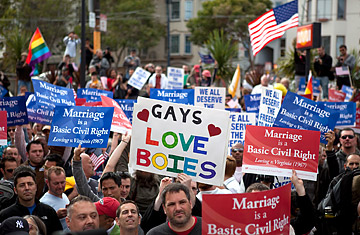
A Prop 8 opponent holds a sign referencing attorney David Boies during a rally to celebrate the ruling to overturn the proposition in San Francisco on Aug. 4, 2010
The federal case to decide whether the U.S. Constitution guarantees the right to gay marriage will take a new turn on Dec. 6, when lawyers on both sides will for the first time make their arguments before more than just judges. The proceedings will be televised on C-SPAN and shown in live feeds to law schools throughout the country. But those arguments — already spelled out in the parties' court filings and amplified by some 47 friend-of-the-court briefs — will be tailored to just three sets of ears: those belonging to the ideologically diverse panel of appellate judges who will decide whether the case can be appealed and, if so, which side should win.
Earlier this year, Chief District Judge Vaughn Walker ruled that the 2008 ballot initiative that changed California's constitution to ban gay marriage had violated the U.S. Constitution. The backers of the initiative, known as Prop 8, appealed, setting up the Dec. 6 showdown before the Ninth Circuit Court of Appeals.
All three judges hearing the arguments are white men, but together they present about as wide a range of judicial experience and approach as possible. On one end of the spectrum sits Circuit Judge Stephen Reinhardt of Los Angeles, appointed to the bench in 1980 by President Jimmy Carter and widely considered one of the most liberal federal judges now wearing robes. He's also the only judge of the three to have already issued a decision in a case relating to gay marriage. In 2009 he sided with Brad Levenson, a deputy federal public defender who wanted the government to extend insurance benefits to the man Levenson had married the year before, when California law had allowed gay marriage. Citing the 1996 Defense of Marriage Act (DOMA), benefits administrators in Washington had refused to do so. In an administrative ruling, Reinhardt ordered the government to pay the benefits, agreeing that application of DOMA in Levenson's case violated the U.S. Constitution. "The denial of federal benefits to same-sex spouses cannot be justified by a distaste for or disapproval of same-sex marriage or a desire to deprive same-sex spouses of benefits available to other spouses in order to discourage them from exercising a legal right afforded them by a state," Reinhardt wrote.
Prop 8 supporters filed papers late on Dec. 1 asking Reinhardt to recuse himself since his wife, a longtime leader of Southern California's ACLU chapter, had worked to defeat the ballot initiative. It's unlikely his wife's activism, however, would require Reinhardt to step aside. Indeed, Reinhardt wasted no time rebuffing the attempt and issued an order first thing on the morning of Dec. 2 dismissing the motion to disqualify him.
But if Reinhardt's record has likely cheered Theodore Olson and David Boies, the lawyers for the wedding-minded gay couples who sued to overturn Prop 8, the panel's makeup provides plenty of encouragement for the other side as well. Sitting beside Reinhardt will be N. Randy Smith, the newest member of the panel. Smith was appointed to the bench by President George W. Bush in 2007 after serving since 1995 as a state trial court judge in Idaho, where he is also a member of the Idaho State GOP Hall of Fame. As a state trial judge, Smith is unlikely to have occasion to tip his hand on gay marriage from the bench, but as a lifelong conservative and two-time graduate of Brigham Young University in Utah, it's likely he will be receptive to arguments put forth by attorney Charles Cooper that Walker overreached in his ruling.
